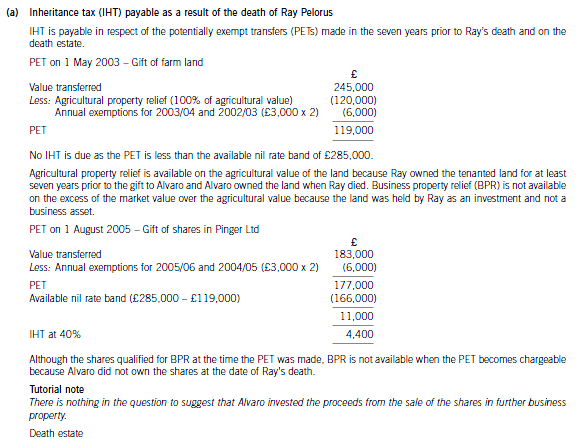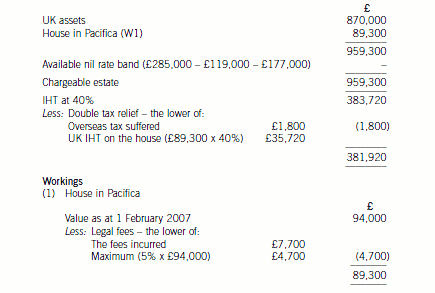ACCA考试费用可以退吗?
发布时间:2021-03-11
ACCA考试费用可以退吗?
最佳答案
ACCA目前是支持退考的。不过这个是有时间限制的。
ACCA退考流程:在正常报考日期截止日前,学员都可以进入myACCA的账户里去修改考试信息,包括退考、更改考场、更改考试科目以及增加报考科目等。
然后,之前缴纳的考试费,acca退考后,会返回到你的ACCA账户里,可以用来缴年费和下次考试。
下面小编为大家准备了 ACCA考试 的相关考题,供大家学习参考。
(c) In the context of a standard unmodified audit report, describe the content of a liability disclaimer paragraph,
and discuss the main arguments for and against the use of a liability disclaimer paragraph. (5 marks)
(c) It has become increasingly common for audit firms to include a disclaimer paragraph within the audit report. However, it is
not a requirement of auditing standards and individual audit firms need to assess the advantages and disadvantages of the
use of a disclaimer paragraph.
The wording is used to state the fact that the auditor’s report is intended solely for the use of the company’s members as a
body, and that no responsibility is accepted or assumed to anyone other than the company and the company’s members as
a body.
The main perceived advantage is that the disclaimer should help to reduce the exposure of the audit firm to liability claims
from anyone other than the company or the company’s body of shareholders. The disclaimer makes it clear that the audit
firm reports only to those who appointed the firm, i.e. the members of the company, and this may make it more difficult for
the audit firm to be sued by a third party.
It is also argued that the use of a disclaimer could help to bridge the ‘expectation gap’ by providing a clearer indication of the
responsibility of the auditor.
In this way the audit firm can manage its risk exposure in an increasingly litigious environment. Recent high profile legal cases
against audit firms, such as the Bannerman case in Scotland, illustrate that an audit firm’s duty of care can extend beyond
the company and its shareholders, and that audit firms should consider how to protect themselves against liability claims.
Tutorial note: It is appropriate here to quote recent cases such as the Bannerman case to illustrate the reason why audit
firms face increased potential exposure to claims from third parties. However, knowledge of specific legal cases is not
required to gain full marks for this requirement.
However, it can be argued that a disclaimer does not necessarily work to protect an audit firm. Each legal case has individual
circumstances, and while a disclaimer might protect the audit firm in one situation, equally it may not offer any protection
where the facts of the case are different.
In addition, it is often argued that if an audit firm conducts an audit using full due care and diligence, there is no need for a
disclaimer, as a high quality audit would be very unlikely to lead to any claims against the audit firm. Consequently, it could
be argued that the use of disclaimers as a means to limit liability could permit low quality audits to be performed, the auditors
being confident that legal cases against them are restricted due to the presence of a disclaimer within the audit report.
1 Alvaro Pelorus is 47 years old and married to Maria. The couple have two children, Vito and Sophie, aged 22 and
19 years respectively. Alvaro and Maria have lived in the country of Koruba since 1982. On 1 July 2005 the family
moved to the UK to be near Alvaro’s father, Ray, who was very ill. Alvaro and Maria are UK resident, but not ordinarily
resident in the tax years 2005/06 and 2006/07. They are both domiciled in the country of Koruba.
On 1 February 2007 Ray Pelorus died. He was UK domiciled, having lived in the UK for the whole of his life. For the
purposes of inheritance tax, his death estate consisted of UK assets, valued at £870,000 after deduction of all
available reliefs, and a house in the country of Pacifica valued at £94,000. The executors of Ray’s estate have paid
Pacifican inheritance tax of £1,800 and legal fees of £7,700 in respect of the sale of the Pacifican house. Ray left
the whole of his estate to Alvaro.
Ray had made two gifts during his lifetime:
(i) 1 May 2003: He gave Alvaro 95 acres of farm land situated in the UK. The market value of the land was
£245,000, although its agricultural value was only £120,000. Ray had acquired the land on
1 January 1996 and granted an agricultural tenancy on that date. Alvaro continues to own the
land as at today’s date and it is still subject to the agricultural tenancy.
(ii) 1 August 2005: He gave Alvaro 6,000 shares valued at £183,000 in Pinger Ltd, a UK resident trading
company. Gift relief was claimed in respect of this gift. Ray had acquired 14,000 shares in
Pinger Ltd on 1 April 1997 for £54,600.
You may assume that Alvaro is a higher rate taxpayer for the tax years 2005/06 and 2006/07. In 2006/07 he made
the following disposals of assets:
(i) On 1 July 2006 he sold the 6,000 shares in Pinger Ltd for £228,000.
(ii) On 1 September 2006 he sold 2,350 shares in Lapis Inc, a company resident in Koruba, for £8,270. Alvaro
had purchased 5,500 shares in the company on 1 September 2002 for £25,950.
(iii) On 1 December 2006 he transferred shares with a market value of £74,000 in Quad plc, a UK quoted company,
to a UK resident discretionary trust for the benefit of Vito and Sophie. Alvaro had purchased these shares on
1 January 2006 for £59,500.
Alvaro has not made any other transfers of value for the purposes of UK inheritance tax. He owns the family house
in the UK as well as shares in UK and Koruban companies and commercial rental property in the country of Koruba.
Maria has not made any transfers of value for the purposes of UK inheritance tax. Her only significant asset is the
family home in the country of Koruba.
Alvaro and his family expect to return to their home in the country of Koruba in October 2007 once Ray’s affairs have
been settled. There is no double taxation agreement between the UK and Koruba.
Required:
(a) Calculate the inheritance tax (IHT) payable as a result of the death of Ray Pelorus. Explain the availability
or otherwise of agricultural property relief and business property relief on the two lifetime gifts made by Ray.
(8 marks)


(ii) Briefly discuss TWO factors which could reduce the rate of return earned by the investment as per the
results in part (a). (4 marks)
(ii) Two factors which might reduce the return earned by the investment are as follows:
(i) Poor product quality
The very nature of the product requires that it is of the highest quality i.e. the cakes are made for human
consumption. Bad publicity via a ‘product recall’ could potentially have a catastrophic effect on the total sales to
Superstores plc over the eighteen month period.
(ii) The popularity of the Mighty Ben character
There is always the risk that the popularity of the character upon which the product is based will diminish with a
resultant impact on sales volumes achieved. In this regard it would be advisable to attempt to negotiate with
Superstores plc in order to minimise potential future losses.
(b) The Superior Fitness Co (SFC), which is well established in Mayland, operates nine centres. Each of SFC’s
centres is similar in size to those of HFG. SFC also provides dietary plans and fitness programmes to its clients.
The directors of HFG have decided that they wish to benchmark the performance of HFG with that of SFC.
Required:
Discuss the problems that the directors of HFG might experience in their wish to benchmark the performance
of HFG with the performance of SFC, and recommend how such problems might be successfully addressed.
(7 marks)
(b) There are a number of potential problems which the directors of HFG need to recognise. These are as follows:
(i) There needs to exist a sufficient incentive for SFO to share their information with HFG as the success of any
benchmarking programme is dependent upon obtaining accurate information about the comparator organisation. This is
not an easy task to accomplish, as many organisations are reluctant to reveal confidential information to competitors.
The directors of HFG must be able to convince the directors of SFO that entering into a benchmarking arrangement is a
potential ‘win-win situation’.
(ii) The value of the exercise must be sufficient to justify the cost involved. Also, it is inevitable that behavioural issues will
need to be addressed in any benchmarking programme. Management should give priority to the need to communicate
the reasons for undertaking a programme of benchmarking in order to gain the full co-operation of its personnel whilst
reducing the potential level of resistance to change.
(iii) Management need to handle the ethical implications relating to the introduction of benchmarking in a sensitive manner
and should endeavour, insofar as possible, to provide reassurance to employees that their status, remuneration and
working conditions will not suffer as a consequence of the introduction of any benchmarking initiatives.
声明:本文内容由互联网用户自发贡献自行上传,本网站不拥有所有权,未作人工编辑处理,也不承担相关法律责任。如果您发现有涉嫌版权的内容,欢迎发送邮件至:contact@51tk.com 进行举报,并提供相关证据,工作人员会在5个工作日内联系你,一经查实,本站将立刻删除涉嫌侵权内容。
- 2021-01-01
- 2021-03-11
- 2021-04-15
- 2021-03-10
- 2021-12-17
- 2021-03-10
- 2021-03-11
- 2021-03-12
- 2021-03-10
- 2021-05-11
- 2021-04-22
- 2021-05-28
- 2021-06-05
- 2021-03-11
- 2021-01-03
- 2021-06-05
- 2021-01-01
- 2021-04-02
- 2021-04-21
- 2021-04-15
- 2021-03-12
- 2021-03-11
- 2021-03-11
- 2021-05-08
- 2021-01-01
- 2021-03-11
- 2021-03-11
- 2021-06-08
- 2021-03-11
- 2021-12-30